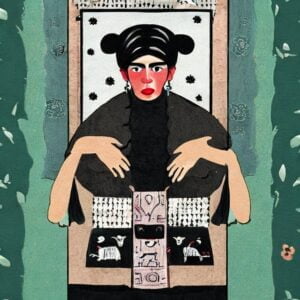Even the female animals in a zoo are treated with more dignity and respect than the female characters in Sandeep Reddy Vanga’s film, who have zero agency.

“I will show them what violence is”- these were the words of Sandeep Reddy Vanga, director of Arjun Reddy and Kabir Singh, ahead of Animal’s release. His commitment and zeal towards making an unapologetically violent film were indeed reflected in Animal, which hit theatres on December 1st, 2023. Starting from scenes portraying aggressive stabbing to throats being slit, the film touches new heights of brutality and violence. Ranbir Kapoor, who plays the protagonist in the film, is being praised by critics and netizens for his “career’s best performance”.
However, in making an “unapologetic” film, the filmmakers have defied all social responsibility through its alarming and misogynistic portrayal of women. Even the female animals in a zoo are treated with more dignity and respect than the female characters in Vanga’s film, who have zero agency. I believe that cinema is an art form which considerably influences society. Therefore, it becomes a tool for advocating for a just cause or spreading propaganda. Hiding under the garb of creative liberty, the makers of the film have used Animal to advance their chauvinistic propaganda through the celebration of toxic men and subjugation of women. Let me highlight the issues of misogyny in the movie one by one via examples.
The film, in the beginning, has a triggering scene. Ranvijay Singh (played by Ranbir Kapoor), while explaining to Geetanjali (played by Rashmika Mandanna), his love interest, why she should leave her fiancé and marry him, argues about the existence of two types of men- the “Alpha” ones (the physically strong men who provide for the family) and the “weak” ones. He opines that her fiancé is weak, so she should be logical enough to marry him, an “Alpha” male. After that follows the unfortunate dialogue – “You have a large pelvis, and hence, you can accommodate many babies”. Consequently, what happens is unsurprising, considering it’s a Vanga film. Geetanjali gets convinced, breaks her marriage with her fiancé, leaves her plan of pursuing PhD in the USA and turns herself into a state of subjugation and marital slavery under Ranvijay.
The writer’s desire to revive a feudal, patriarchal society is evident through this sequence. In an era where motherhood is a choice, and women run business and politics, the filmmakers have reinforced the “age-old decayed” notion of a woman being a caretaker and child bearer.
Subsequently, a “damsel in distress” sequence appears again in the film’s first half. However, this sequence is miles ahead of (read: worse than) Kabir Singh thrashing a guy who touched Preeti. Ranvijay, upon realising that her sister is facing ragging in college, brings a gun to her class and starts firing to threaten students. Amidst all the hooting and cheering for this scene, it is high time we realise that men being “violent protectors” is nothing to be celebrated. The filmmakers of Animal have left no stone unturned to validate the male characters in the film through violence and physical superiority over women.
Above all, it is the second half which has the most shameful moments, which shall go down in the history of cinema as a deliberate attempt to criticise and commodify women under the disguise of portraying reality. First up is a scene where we see Ranvijay berating his wife, Geetanjali, before his cousins. He advises his cousin brothers that the husband must always have a “tight grip” over his wife. Or else the wife becomes assertive. If Animal is rated based on the justice it does towards propagating “marital slavery”, it would be a ten on ten. Male characters in the film are not the only issue. The men behind the camera are massive red flags for conceptualising and writing such dialogues.
Secondly, there are multiple moments in the second half which normalise domestic violence. These include the scenes of Ranvijay pinching his wife, choking her and even putting a gun on her forehead (stopping just short of firing the bullet). The story promotes domestic violence and celebrates masculinity.
Thirdly and finally, the filmmakers unsurprisingly did not forget to add the extra-marital affair ingredient to cook a delicious misogynistic recipe. Although as part of a conspiracy, Ranvijay ends up kissing, romancing and having sexual intercourse (without protection) with Zoya (played by Tripti Dimri) to extract information about his father’s assassin. However, after he confesses this to his wife and she angrily seeks divorce, he refuses to part ways so that his children do not have to grow up in a broken family. It is worth mentioning that Geetanjali is shown keeping a karwa chauth fast before his confession. While men in Vanga’s film have the liberty to massacre people and indulge in sexual affairs, women strictly conform to their traditional assigned roles.
To sum up, in a profoundly patriarchal society like India, where the State and other agencies are making efforts to empower women, Animal has the potential to flare up gender stereotypes and reinforce toxic masculine tropes. Sandeep Reddy Vanga’s film is neither creative (in terms of the story) nor clever. Although it may be “unapologetic” in showcasing violence, it needs to apologise to all Indian women for taking the feminist movement decades back to feudal patriarchy. The personal is political.

Riyan Buragohain
Riyan holds a Bachelor’s degree in Political Science, History and English (Triple Majors) from Christ University, Bengaluru. His works on geopolitical and social issues have been published in Feminism in India, Modern Diplomacy, International Policy Digest, and Jus Corpus Law Journal.



